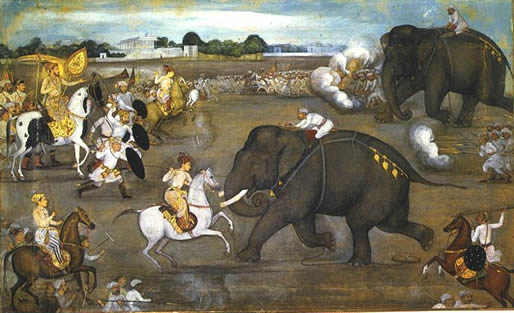Aurangzeb was the sixth Mughal emperor (r. 1658–1707). He ruled for 49 years as Emperor Alamgir (conqueror of the universe); he was the last great ruler of the Mughal dynasty, but left the empire economically exhausted and widely disaffected.
As Shah Jahan aged, his sons openly rebelled against him. The winner was the 44-year-old Aurangzeb, who imprisoned Shah Jahan and killed all three of his brothers. His personal strengths included widespread administrative and military experience, strict frugality in personal life, and devotion to work. He curbed corruption and took measures to improve agriculture.
A strict and devout Muslim, he was also a bigot who had no tolerance of other religions and persecuted their followers. Thus began his troubles, which also contributed to the disintegration of the Mughal Empire. He ordered Hindu schools closed, had many Hindu temples destroyed, and ousted many Hindus from government service.
  |
Although he could not eliminate all Hindus from government, no Hindu under him rose to high positions. The last straw for Hindus was the reinstatement of the poll tax and other harsh taxes on non-Muslims, which had been dropped under his ancestor, Emperor Akbar.
Aurangzeb’s religious policy contributed to the growth of revivalist Hinduism, a mixture of religion and what may be termed protonationalism. It began in southern India under Shivaji, who rebelled in 1662, heading the Maratha Confederacy.
 |
| The Mughal Army under Aurangzeb recaptures Orchha in October 1635 |
Long and costly campaigns failed to end the Marathas’ insurgency. In 1683, the Rajputs, powerful Mughal supporters, also revolted, even attracting one of Aurangzeb’s sons to their cause. While his lieutenants led the campaigns against the Marathas and Rajputs, Aurangzeb took personal charge of a drawnout war in the south, where he had been viceroy under his father.
His objective was to subdue the two remaining independent kingdoms of the Deccan, beginning in 1683. He was militarily successful, with the result that the Mughal Empire under Aurangzeb extended from Kabul in the north to Cape Comorin to the south."
However, the wars left the empire financially exhausted and the overtaxed peasants in revolt. Moreover, his total preoccupation with the campaign and absence from the capital had left the administration neglected.
Aurangzeb died in 1707 at the age of 89. Because he ascended the throne after killing his brothers, he trusted no kinsman and kept all power in his own hands. His religious bigotry alienated Hindus and his focus on subduing rebels and expanding the empire left him unaware of the new shift of power among Europeans in India and the passing of maritime supremacy from the Portuguese to the English.
His Muslim generals served him faithfully in his life, but rose to usurp his inept sons’ inheritance after his death. Mughal power soon declined and fell.
 |
| Prince Aurangzeb facing a maddened elephant named Sudhakar (7 June 1633) |
